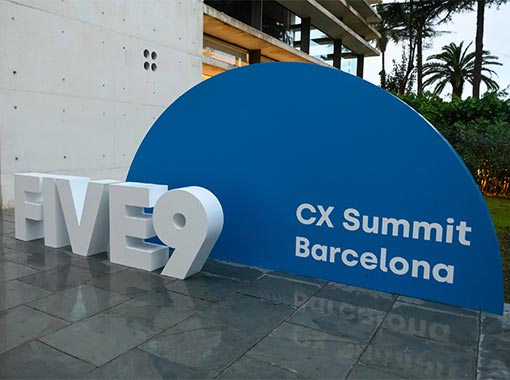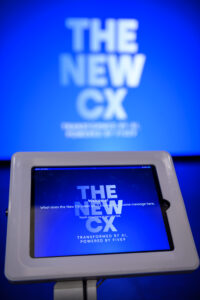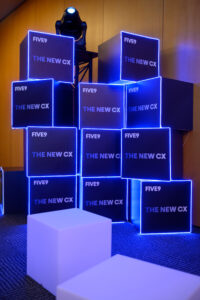The Five9 CX Summit 2024 in Barcelona brought together industry leaders, innovators, and technology enthusiasts to explore the evolving landscape of customer experience (CX).
From AI-driven solutions to global partnerships, the event showcased transformative ideas and practical implementations, offering businesses a roadmap to navigate the challenges and opportunities of modern CX.
Couldn’t make it to the event this year? Here are the session highlights from the packed agenda, to bring you up to speed with the latest CX challenges and opportunities:
The New CX Starts Here

The opening session of the Five9 CX Summit set the tone for discussions on the future of CX. CEO Mike Burkland outlined the concept of the “new CX,” a vision for modernising customer interactions with the integration of AI and unified platforms to deliver “seamless, personalised, and efficient” service.
Reflecting on the limitations of the “old CX,” Burkland pointed to outdated systems, clunky IVRs, and fragmented customer journeys, which have historically led to poor satisfaction, high costs, and agent burnout. “The old CX was disconnected, costly, and frustrating for everyone,” he noted.
In contrast, Burkland argued, advancements in AI now enable businesses to empower both virtual and human agents to collaborate effectively, creating better outcomes with greater efficiency. “Brands no longer have to trade off between self-service automation and great CX,” he added.
The Three Pillars of Modern CX
Burkland’s presentation emphasized three central components underpinning this new approach:
- AI-Powered Solutions: Tools like the Five9 Genius AI suite enable virtual agents to autonomously handle tasks such as authentication and resolving queries, reducing the need for human intervention in routine processes.
- Unified Platforms: Seamless integration of interactions across channels helps businesses maintain consistency while delivering personalised experiences.
- Expert Guidance: Support from CX specialists plays a crucial role in helping businesses navigate the complexities of implementing AI solutions effectively.
Burkland framed AI as more than just a tool for cost-cutting. He described it as a means to enhance customer relationships, saying, “Happy customers turn into repeat customers and passionate advocates for your brand.”
Case Studies: CX in Action
To illustrate the practical applications of these ideas, Chief Operating Officer Andy Dignan introduced two business leaders who shared how they’ve transformed CX within their organizations:
Steve Drew, RNL
Drew detailed how adopting AI-driven tools helped RNL modernize outdated systems, integrating hyper-personalization into education and fundraising efforts. “For us, AI is about changing the way we engage and doing it at an individual level,” he explained.
Jon Davis, The Ivy Collection
Davis spoke about how his team leveraged Salesforce integration to improve both pre- and post-visit customer experiences, reducing response times and pre-empting issues before they escalated. “We’ve even lowered call volumes by getting to customers before they have to call us,” Davis said.
Building a CX Ecosystem
Burkland announced expanded partnerships with Salesforce and ServiceNow, emphasizing the importance of collaboration in delivering comprehensive CX solutions. These partnerships aim to simplify CX operations while enhancing experiences for both customers and employees.
A notable development was the introduction of the AI Blueprint programme, a tailored strategy designed to help businesses implement AI in ways that align with their specific needs. By pairing companies with experts, the programme aims to demystify AI integration and optimize its impact on operations.
A Transformational Opportunity
The session concluded with a call for businesses to embrace the opportunities AI presents to reimagine customer experiences. Burkland highlighted personalization, seamless integration, and proactive engagement as key to staying ahead in the evolving CX landscape.
Humans + AI: Driving Toward Actual Intelligence
This session explored the intersection of human creativity and AI, focusing on how businesses can achieve “actual intelligence” in CX.

Callan Schebella, Five9’s EVP for Product Management, began by reviewing milestones from 2024, including the introduction of Five9 Genius AI, the launch of GenAI Studio, and the acquisition of Acqueon.
He noted these developments as indicative of a broader shift in CX innovation, where technology and human ingenuity work together to enhance interactions.
Europe, he explained, has been at the forefront of adopting AI technologies, with chatbots leading the way. However, Schebella emphasized that AI’s real potential lies in its ability to move beyond simple automation.
By integrating large language models (LLMs) with contextual data, AI can deliver real-time, dynamic problem-solving.
Data as the Foundation of Intelligence

Jonathan Rosenberg, Five9’s CTO & Head of AI, expanded on these ideas, introducing the Genius AI Process, a framework for leveraging AI to listen, analyze, and tailor solutions to customer needs.
Rosenberg framed data as the backbone of modern CX, driving both efficiency and personalization.
In a live demonstration, Rosenberg showcased AI Insights, a tool that transforms unstructured data – such as call transcript – into actionable intelligence.
By identifying patterns and inefficiencies, such as issues within loyalty programmes, businesses can refine their operations and enhance customer satisfaction.
Rosenberg also highlighted GenAI Studio, a platform for customizing AI models to meet specific business needs. During the demo, GenAI Studio generated detailed summaries of customer interactions, reducing handle times and improving the continuity of service across calls.
Further innovation was demonstrated with AI Knowledge, a feature that merges static resources, such as policy documents, with live customer data.
Rosenberg demonstrated how it can handle complex queries, such as loyalty programme exceptions, with accuracy and speed, reducing reliance on human agents for routine inquiries.
Partnerships and Integration
The session concluded with a focus on collaboration, particularly through partnerships with ServiceNow and Salesforce. These alliances aim to streamline CX operations by unifying voice and digital channels while reducing complexity.

Michael Ramsey, GVP, Customer and Industry Workflow Products for ServiceNow, joined the discussion to explain how their integration of real-time transcription and unified routing supports more adaptable and scalable CX strategies.
This collaboration reflects an industry-wide push toward interconnected systems that balance technological sophistication with operational simplicity.
Experiences Redefined: Real Stories of CX Innovation
In this session, Five9 COO Andy Dignan introduced a panel of CX leaders from Alaska Airlines, Sony, FNAC, and RNL.
Dignan began with a reflection on the shifting landscape of CX. Customers today have little patience for poor experiences, he noted, with 73% citing CX as the deciding factor in their purchasing decisions (according to PwC).
Technology, particularly AI, has become the critical enabler for brands to meet and exceed these rising expectations. However, Dignan explained, “the old tricks don’t work anymore”. Instead, AI now allows businesses to drive hyper-personalization, improve efficiency, and deliver “truly frictionless” experiences.
Personalisation: A Shared Vision Across Industries
Lori Bradshaw, managing director of Guest Care at Alaska Airlines, shared how her team focuses on understanding where customers are on their travel journey.
From booking to baggage queries, the airline prioritizes removing friction at every touchpoint. “It’s about delivering care at the moment it’s needed most,” she said, emphasizing how AI tools help agents tailor responses and streamline resolutions.
Kris De Pauw of Sony Europe echoed on the importance of personalization. Whether serving a home electronics customer or a broadcast studio client, Sony adapts its approach to meet specific needs.
“Everyone wants to feel recognized,” he said, stressing the need for a seamless experience across channels, aided by knowledgeable agents and well-integrated AI.
Carla Figueira of FNAC highlighted how the retail giant balances convenience, expertise, and personalization.
The company leverages AI to provide agents with consistent, accurate information while enhancing logistics to meet customer demands faster. “It’s about delivering what the client wants, how they want it,” she explained.
Stephen Drew of RNL brought a different perspective, focusing on students and universities. He shared how the organization uses AI-driven tools to proactively identify students at risk of dropping out, reaching out with hyper-personalized messages to offer timely support.
“We’re combining language models and structured data to make experiences more meaningful,” he said, pointing out that such strategies can improve graduation rates and student outcomes.
Overcoming Challenges: Fear, Complexity, and Integration

The panelists were candid about the hurdles they face in implementing AI. Drew admitted that resistance to change, particularly around governance and processes, remains a significant obstacle for universities. “You can have the best tools, but without buy-in, it’s hard to make real progress,” he observed.
Bradshaw shared that Alaska Airlines’ agents had mixed reactions to AI. “There’s excitement, but also concern,” she said. “It’s about making sure they see AI as a tool to help them, not replace them.”
For Figueira, the challenge lies in breaking down organizational silos to enable better data integration. “It’s a different culture we’re trying to implement,” she noted.
De Pauw highlighted the difficulty of adhering to Europe’s stringent GDPR regulations while maintaining customer trust, calling it “a balancing act we have to get right.”
AI as a Game-Changer
Each panelist highlighted specific ways AI is transforming their organizations. Bradshaw described how Alaska Airlines uses AI to summarize calls, allowing agents to focus more on guest interactions. “It’s a small change, but it makes a big difference,” she noted.
Drew outlined RNL’s use of AI in fundraising, explaining how the technology crafts targeted campaigns that resonate on an individual level. “It’s about creating a connection, not just asking for donations,” he said.
Figueira shared FNAC’s three-step programme for leveraging AI: customer data platforms, marketing automation, and CRM integration. “It’s ambitious, but the results speak for themselves,” she said.
De Pauw emphasized Sony’s global approach to data consolidation, which supports customers in 27 languages across 31 countries. “Better insights mean better decisions,” he said, adding that this approach improves both reporting and customer service.
Tips and Insights From Around the Torre Melina
Call Centre Helper’s very own Xander Freeman conducted a great number of interviews live at the Five9 CX Summit – you can find all of them on our LinkedIn page. Here’s a selection of snippets from the show floor.
“Being able to authenticate patients is absolutely critical when you’re in the healthcare space. We’re automatically able to identify the caller, and previous customers, and are able to give them a personalized experience based on those previous encounters. That’s been a very important game-changer for us.
“When it comes to patient scheduling, being able to ensure you’re providing a very flexible service, allowing them to cancel, pull appointments forward, etc, is extremely important.
Our AI algorithms are able to do that. We’re able to look at the patient, the demographics, the modality, and we’re able to deliver the service to them in the most efficient manner possible.”
Enda Murphy, US Radiology Specialists CTO
“AI Agents is the next step in self-service for contact centres, using the power of generative AI. It allows you to take the best of the capabilities that we’ve always had around self service, sprinkle in generative AI and we get the flexibility, the power, the ease of implementation.
Our customers can then decide how much they want to use generative AI, how much they use traditional techniques, to give the ultimate outcome – great self-service with minimal risk.”

Jonathan Rosenberg, Chief Technology Officer & Head of AI
“2023 was all about implementing AI. 2024 is all about AI outcomes. We’re now hearing ‘I can apply this to the business problems that I have’ and it’s exciting to have made that step forward.”
Sheila McGee-Smith, CX industry expert
“Great technology is only one part of it. Without having partners to implement the technology and manage the customer success, you wouldn’t get very far. That’s a massive part of it, so it’s been fantastic seeing the services partners.”
Mike Pryke-Smith, VP of Strategic Partnership EMEA at Verint

“Play well with others! It’s all about removing silos and having the data work for you and the customer. It enlightens that experience for everyone.”
Jason Griffin, Principle Solutions Consultant at Five9
CX Like Never Before: Fireside Chat with The Ivy Collection

In a candid fireside chat between The Daily Beast CCO Joanna Coles, Five9 VP EMEA Thomas John, and The Ivy Collection’s CTO Jon Davis, the trio discussed the evolving role of CX in the hospitality industry. The conversation delved into how technology, data, and personalization are reshaping luxury dining.
Balancing Scale and Personalization
Joanna Coles opened the session by asking, “What does a luxury restaurant group need from customer experience?” Jon Davis acknowledged the challenge of catering to millions of customers across 125 locations while retaining the personal touch that defines a premium dining experience.
“Our face-to-face service has always been excellent,” Davis remarked, “but digitally, we needed to elevate to match that same level of quality.”
He explained the diverse needs of The Ivy’s customer base, adding, “Some customers want to book a table in ten seconds and leave it at that, while others expect us to know their favorite table, their last visit, or even their birthday.”
Understanding Customer Behaviour

Thomas John highlighted a surprising competitor to the dining-out experience: staying in. “Your biggest competition isn’t another restaurant – it’s Netflix and chill,” he said, emphasizing the need for restaurants to create compelling reasons for customers to leave their homes.
Davis underscored the importance of integrating customer data to ensure a seamless and personalized experience across all channels.
“We wanted one pane of glass for our staff – a unified screen where they can see customer history, preferences, and interactions,” he explained. This system ensures consistency, whether a customer engages via phone, chatbot, or social media.
Leveraging AI for Personalization
Personalization emerged as a central theme in the discussion. “We track favorite restaurants, dishes, and booking preferences,” Davis explained. “When a customer calls, we know if their last experience wasn’t great, and we can address it immediately.” He credited Salesforce CRM as a key tool in building this comprehensive view.
Davis also touched on the increasing demand for private members’ club-style experiences, explaining, “People want to feel recognized and valued, and they’re increasingly comfortable sharing their data for that value exchange.”
The Ivy’s loyalty app, which now boasts over 250,000 users, reflects this trend by offering tailored rewards and exclusive benefits for its top-tier members.
AI’s Role in Streamlining Operations
AI has become integral to The Ivy’s ability to meet these expectations. “It’s about getting the right customers to the right person quickly and efficiently,” Davis explained, highlighting how automating routine queries – such as opening hours or parking information – frees up staff to handle more complex interactions.
John expanded on the operational impact of AI, noting its use in pre-call insights and post-call summaries. He pointed to future plans for AI-driven outbound communication, including reminders for reservations and filling last-minute cancellations. “AI can help us be proactive rather than reactive,” he said.
Opportunities and Challenges
When discussing future opportunities, Davis highlighted outbound engagement as a key focus. “We’re great at inbound communication, but 2025 will be about mastering outbound,” he said. He described plans for AI-powered alerts to inform customers of table cancellations or exclusive offers.
However, Davis acknowledged the challenges of maintaining accuracy and trust in a data-driven environment. “If you address the wrong guest or fail to personalize correctly, it can be detrimental,” he admitted, adding that The Ivy relies on its frontline teams to handle such situations with agility.
As the session concluded, Davis reflected on the importance of staying agile in an evolving CX landscape. “It’s about recognizing loyalty, delivering what they want, and making every interaction memorable,” he said.
CX Titans: Global Partners Driving the Future of Customer Engagement
Jake Butterbaugh, Senior Vice President of Five9’s Global Partner Organization, hosted a session alongside ServiceNow’s Michael Ramsey, BT’s Vijay Venugopalan, and Verint’s Mike Pryke-Smith, showcasing how these partnerships are redefining customer engagement.
Partnerships at the Core of Innovation
Butterbaugh opened by emphasizing the central role of partnerships in modernizing CX. “Over 80% of our deals are partner-influenced, and nearly every integration involves technology alliances,” he said, stressing the importance of trust and collaboration in delivering business value.
Ramsey highlighted ServiceNow’s approach to streamlining customer workflows. “Our platform focuses on capturing requests, orchestrating processes, and ensuring customers get what they need,” he explained.
He also touched on their collaboration with Five9, noting, “With real-time transcription and unified routing, we’re reducing operational complexity while improving customer experiences.”
Pryke-Smith focused on how AI is reshaping workforce engagement. “We’ve been known for workforce management for years, but now we’re using AI to deliver CX automation,” he said.
He introduced Verint’s coaching bot as a key example, explaining, “It analyses conversations in real time and provides live guidance to agents. Imagine a tool that tells an agent to slow their speech or change their tone to better connect with the customer.”
Venugopalan highlighted the challenges and opportunities in integrating global connectivity solutions. “Our goal is to be the world’s most trusted connector of people, devices, and machines,” he said.
He noted the importance of making technology work for customers through seamless integration, adding, “It’s not just about innovation but ensuring it fits into the daily operations of our clients.”
The Role of AI

The conversation frequently circled back to AI’s transformative potential. Ramsey called self-service solutions “a killer CX innovation,” explaining that advancements in AI are enabling automated interactions that feel natural and intuitive. “It’s not about flashy technology,” he said, “but about solving real problems in the customer journey.”
Venugopalan addressed common fears around AI adoption, particularly the misconception that automation might replace human agents. “AI isn’t about replacing people,” he said.
“It’s about empowering agents to handle complex enquiries with less stress and greater efficiency.” He outlined BT’s focus on balancing cost-benefit analyses, operational readiness, and ethical considerations in AI deployment.
Pryke-Smith stressed the importance of embedding AI into specific workflows before scaling. “Start small,” he advised. “Look at where AI can address existing inefficiencies, like quality monitoring or coaching, and build from there.”
Challenges in Implementation
The panel also discussed the hurdles businesses face in adopting new technologies. Venugopalan noted, “For many organizations, the challenge lies in operationalizing AI.
Do they have the right skills, processes, and data to make it work?” He highlighted the need for cultural change within organizations, particularly in aligning people, processes, and technology.
Ramsey echoed these concerns, urging businesses to focus on tangible outcomes. “It’s not about chasing trends or adopting tech for the sake of it,” he said. “It’s about delivering meaningful results for customers.”
As the session drew to a close, Butterbaugh reflected on the key takeaway: the need for a balanced approach to digital transformation.
Displaying a slide that illustrated the importance of aligning people, processes, and technology, he noted, “When one of these is out of sync, the whole system struggles.” Ramsey added, “Success comes from focusing on solving real problems. Technology alone won’t get you there.”
The Five9 CX Summit 2024 Highlighted the Transformative Potential of AI
The Five9 CX Summit 2024 highlighted the transformative potential of AI, partnerships, and innovation in reshaping customer engagement.
Across industries, the event showcased how businesses are leveraging technology to enhance personalization, streamline processes, and meet evolving customer expectations.
From tailored experiences to seamless integrations, the summit emphasized the importance of aligning people, processes, and tools to deliver impactful results.
As businesses navigate a rapidly changing landscape, the insights shared underscored the need for agility, collaboration, and a customer-first mindset to stay ahead in the future of CX.
For more information about Five9 - visit the Five9 Website
Author: James Groves
Reviewed by: Megan Jones
Published On: 6th Dec 2024 - Last modified: 11th Dec 2024
Read more about - Latest News, Five9, James Groves






 Five9 empowers organizations to create hyper-personalized and effortless AI-driven customer experiences that deliver better business outcomes. Powered by Five9 Genius AI and our people, the Five9 Intelligent CX Platform is trusted by 3,000+ customers and 1,400+ partners globally. The New CX starts here and it's at the heart of every winning experience.
Five9 empowers organizations to create hyper-personalized and effortless AI-driven customer experiences that deliver better business outcomes. Powered by Five9 Genius AI and our people, the Five9 Intelligent CX Platform is trusted by 3,000+ customers and 1,400+ partners globally. The New CX starts here and it's at the heart of every winning experience. 































